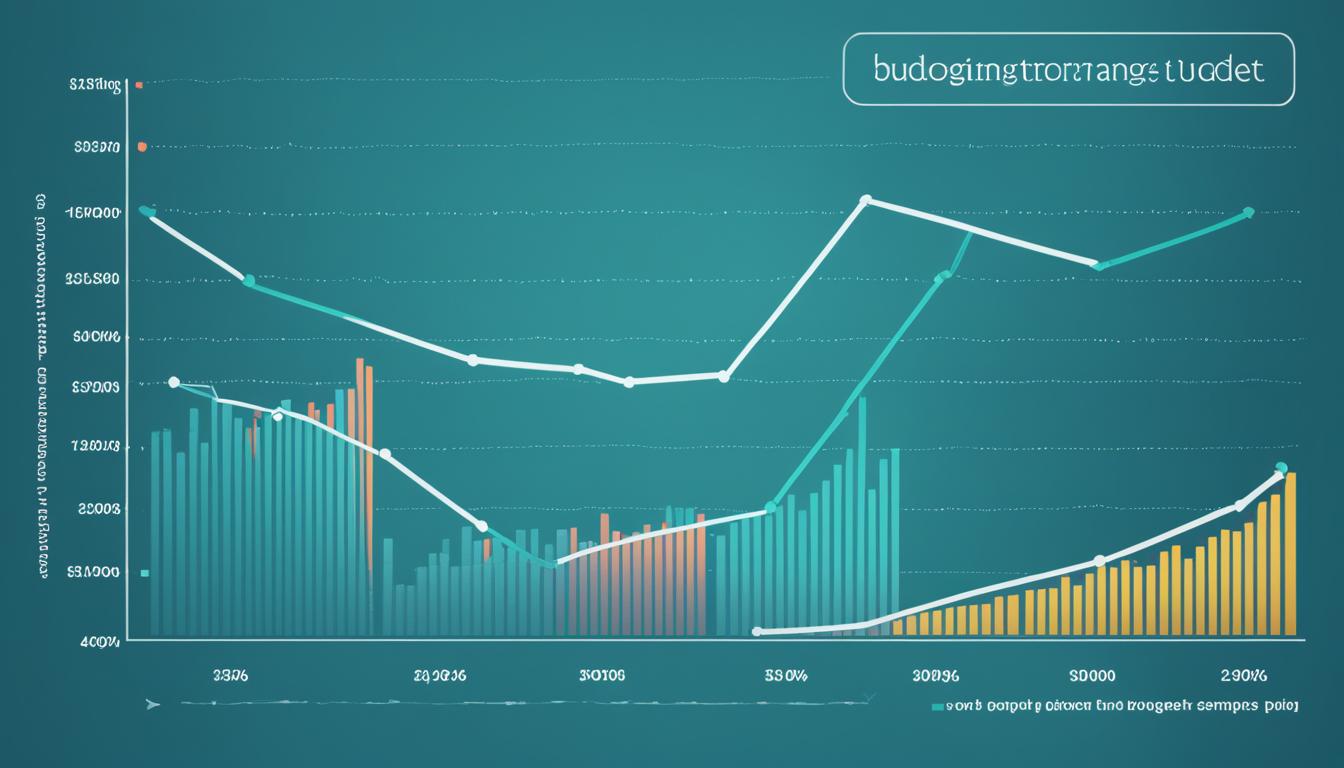More than 60% of Americans find it hard to live from one paycheck to the next. This is a significant problem for many.
Do you feel stuck because of money, stopping you from chasing your dreams? We might have a solution.
Set yourself free with blogging and flexible budgeting. They can help you reach financial freedom. You’ll break away from living from paycheck to paycheck. Instead, you’ll get the chance to work towards your big dreams.
How do blogging and flexible budgeting better your future? Let’s find out more.
Setting your finances straight can mix well with being online, thanks to blogging and flexible budgets. With a job, your money might not always be secure. Blogging can change that, letting you earn big with little cost to start. It’s a great path to financial independence.
Discover how flexible budgeting can improve sustainability measures.
The Importance of Financial Planning for the Future
Financial planning secures our future. It ensures long-term stability. In today’s world, jobs alone might not be enough. We need to control our finances and plan for the future.
Planning helps us control our money and reach our goals. It lets us see where we can improve financially. And, it helps us make smart choices to reach our financial dreams.
Blogging can help a lot with financial planning. It lets people earn extra money and gain financial freedom. With a blog, people can share their skills online and make money.
The National Center for Education Statistics shows how crucial planning is. One study proves planning leads to more wealth and financial happiness.
The Benefits of Financial Planning
Setting financial goals is a big plus of planning. It helps us save for big things like buying a house or educating our kids. With a plan, our dreams can come true.
Planning also helps us face surprises better. By saving for emergencies and having insurance, we’re ready for tough times. This gives us peace of mind.
And, planning makes our investments smarter. It considers how much risk we’re okay with and when we need the money. This way, we grow our wealth over time.
The Role of Blogging in Financial Planning
Adding blogging to our plans can speed up our financial growth. It’s a low-cost way to reach people globally and make money from our knowledge.
With a blog, we can earn money without working all the time. It gives us more freedom and less reliance on typical jobs. So, we can work the way we want.
The Low Start-Up Costs and High Income Potential of Blogging
Blogging is a great option for starting a new business due to its low costs and chance for high income. Compared to traditional businesses, the start-up costs for a blog are minimal. You only need a domain name, web hosting, and a content management system to get started.
But what’s really exciting about blogging is how much money you can make. Bloggers can earn big through affiliate marketing, sponsored content, and online courses. Blogging offers many ways to make money, helping people achieve financial freedom.
Creating valuable content and engaging your audience can lead to more income opportunities. Bloggers who attract a strong following can start partnerships and get sponsorships. This can enhance their overall income a lot.

If you want to increase your income or do blogging as a full-time job, it’s a good choice. As your blog becomes more popular, your income chances grow. With hard work and smart money-making steps, you can find success in blogging.
Thinking about starting a blog? It’s a great time to try. With low costs and a promise of good earnings, blogging can lead to financial freedom and a life on your terms.
The Reality of Living Paycheck to Paycheck
Many people today experience living paycheck to paycheck. This means they struggle to pay for basic needs and can’t save money. Such a situation is tough and stops people from reaching their financial dreams.
A study showed that people making up to $250,000 yearly still live this way[^source]. It proves anyone can feel the strain of managing money, no matter their income. The key is managing money wisely, not just the amount you make.
This kind of lifestyle is very stressful, bringing worry and fear of sudden bills. It makes people feel weak and hampers their chance of reaching money goals. Things like saving, investing, or holidaying may seem impossible.
Yet, there’s hope to end this financial struggle. Starting a blog can turn into a great side income. It helps lessen the grip of living from one paycheck to another.
With your own blog, you can share what you love and find others who love it too. As more fans join, you can make money from ads, sponsored posts, and teaching online. This income is not limited like a usual job.
So, blogging can add to your income or become your full-time job. It takes work and time but can lead to a more stable financial life.
If you’re tired of living from one paycheck to another, blogging might be your answer. It gives you a chance to manage your money future better. Begin your blog today for a better tomorrow.
Ready to leave the paycheck-to-paycheck life behind? Blogging offers a way out. See how it can change your financial picture by following this link. It explains how different incomes are affected by living this way.
The Benefits of Flexible Budgeting
Flexible budgeting is a game-changer for how you handle finances. Unlike fixed budgets, these budgets can change as costs and revenues do. This approach has lots of pluses for your money management and smart choices.
Enhanced Accuracy
Making changes in your budget as needed gives a real picture of your finances. It helps match your budget to what’s happening now in your business. This brings sharper financial predictions and keeps your decisions grounded in real-time info.
Promotes Agile Decision-Making
Being able to quickly change your budget means making smart choices fast. You can adjust spending to better use your money, reacting swiftly to market shifts. This helps you grab new chances as they come, making your business more agile.
Efficient Resource Allocation
With flexible budgeting, you can spend your money smarter. Tailoring your budget to real costs and earnings helps you get more from every dollar. This way, you can invest strategically and put your resources where they’re most effective, making your operations run better.
Improved Financial Forecasting
Thanks to flexible budgeting, making future financial predictions is more accurate. Keeping your budget up to date with what’s really going on in your business helps. It guides your choices on future investments, growth plans, and financial aims, steering your business towards lasting success.

| Benefits of Flexible Budgeting |
|---|
| Enhanced accuracy in financial forecasting |
| Allows for agile decision-making |
| Efficient resource allocation |
| Improved financial forecasting |
Why Flexible Budgeting is Crucial for SMBs
Small to medium-sized businesses (SMBs) have their own set of financial hurdles. They deal with more financial ups and downs than big companies. This comes from market changes, evolving customer needs, and uncertain business cycles.
Flexibility in budgeting is key for SMBs. It helps them quickly change financial plans when needed. This means they can use their money better, boost earnings, and face tough times.
With flexible budgets, SMBs can tweak spending based on what money they make and spend. This is unlike fixed budgets that don’t change. Having a budget that can flex means they can match their spending with business reality. This leads to smarter money choices and better results.
[“https://www.sage.com/en-us/blog/new-flexibility-in-budgeting/”]
Using flexible budgeting is smart for SMBs. It lets them prepare for challenges, grab chances, and outdo rivals. This way, they can be more secure financially, grow, and keep up in the market.
| Benefits of Flexible Budgeting for SMBs |
|---|
| Enhanced Accuracy |
| Agile Decision-making |
| Efficient Resource Allocation |
| Improved Financial Forecasting |
The benefits of flexible budgeting for SMBs include:
- Enhanced Accuracy: Flexible budgeting lets SMBs tweak their budgets based on what’s really happening. This means financial decisions use up-to-date info. It makes planning and choices smarter.
- Agile Decision-making: A flexible budget means SMBs can change plans fast. This helps them meet their big goals, make the most of opportunities, and solve problems well.
- Efficient Resource Allocation: With flexible budgets, SMBs can spend their money where it matters most. This ensures that every dollar they spend helps them grow and succeed.
- Improved Financial Forecasting: Adaptable budgets let SMBs guess future finances better. This means they can plan and take action more wisely.
For SMBs, being able to adjust money plans isn’t just about finance. It’s a way to think that values change and being tough. Using flexible budgets, they can face unpredictable times and aim for lasting growth and success.
Check back for the next part, where we talk about how to start using flexible budgeting in SMBs.
Benefits of Flexible Budgeting for SMBs
Flexible budgeting helps small to medium-sized businesses (SMBs) in many ways. As an SMB owner, I’ve seen how it improves accuracy and promotes agile decision-making. It also helps us better distribute our resources.
Enhanced Accuracy
With flexible budgeting, SMBs can update their budgets as they see real results. This makes our financial choices based on what’s happening now. Watching our costs and income closely lets us predict more precisely. So, we can make smarter financial decisions, which helps our bottom line.
Agile Decision-Making
Being able to adjust quickly is key in the business world today. Flexible budgeting lets us move resources around fast when things change. This helps us grab new chances, lower risks, and deal with surprises. It’s all about making fast, smart money moves, which we need to keep up and succeed over time.
Efficient Resource Allocation
I know how crucial it is for my SMB to use our money wisely. Flex budgeting makes sure we spend each dollar where it matters most. We keep a close eye on spending, see what works, and move money to best fit our goals. This saves us cash and makes sure our efforts pay off.
Improved Financial Forecasting
Forecasting the future finances is key for any SMB. Flexible budgeting helps us get better and more current financial info. This means we can predict more accurately. With the latest data in our forecasts, we understand our financial position better. This helps us chart a clearer path for growth.
For my SMB, flexible budgeting has brought many positives. It has increased our accuracy, made us quicker in decisions, and optimized how we spend. It has also given us better financial predictions. By improving our budgeting over time, we’ve grown more stable and ready for the future.
Implementing Flexible Budgeting in SMBs
Starting flexible budgeting in small to medium-sized businesses (SMBs) needs good planning. It’s key to first create a solid static budget. This budget is a base for financial plans and the starting point for future changes.
After setting a static budget, introduce flexibility. Adapt to variable costs and different revenue situations. This helps SMBs adjust their budget as needed, keeping financial choices in line with performance.
Technology is vital in making flexible budgets work well. Advanced financial software offers real-time data to spot trends and adjust budgets. Automated updates and planning for various scenarios make budgeting faster and more precise.
Building a flexible mindset in the company is also very important. It’s crucial to push team members to think creatively past short-term goals. This boosts the budgeting process’s flexibility.
Benefits of Implementing Flexible Budgeting in SMBs:
- Greater accuracy in financial planning
- Improved decision-making based on real-time data analysis
- Efficient resource allocation and optimization
- Enhanced financial forecasting and risk management
Introducing flexible budgeting improves more than just finances. It helps SMBs stay stable, react well to market shifts, and find new chances.

| Steps to Implement Flexible Budgeting in SMBs |
|---|
| Create a baseline static budget |
| Identify variable costs and revenue scenarios |
| Utilize technology for real-time data analysis |
| Automate adjustments and scenario planning |
| Foster a culture of agility within the organization |
Potential Pitfalls of Flexible Budgeting and How to Avoid Them
Flexible budgeting has many good sides. Still, there are pitfalls to watch out for. If you know them and dodge them, your method can work better for your organization.
Over-Complication
One big issue with flexible budgeting is making it too complicated. This can confuse people and make things less stable. To keep it simple, set clear rules for any budget changes. This helps keep things on track and stable.
Lack of Discipline
Not keeping up with the budget is a common issue too. If you don’t check and update it often, it loses its value quickly. To avoid this, make checking and adjusting the budget a habit. Use current data and business needs to guide these updates.
Over-Reliance on Technology
Technology is key in flexible budgeting, but too much reliance can be a problem. You need human brains to really understand the budget’s story. Balancing tech and human skills is key. This way, you can make smart money moves that fit your goals.
Dealing with these issues head on can keep your flexible budgeting helpful and effective. With a clear plan and regular checks, you can make your financial choices even smarter. This will push your organization towards success.
What is a Flexible Budget?
A flexible budget helps businesses change their spending as needed. It’s not like a fixed budget. It adapts to how well the business is doing. This makes financial planning easier and more accurate.
Businesses can match their spending with what’s happening now. If they make more sales than expected, they can spend more. This helps them grow. If sales go down, they can cut back. It keeps them financially stable.
Many small to medium businesses face growth challenges. A flexible budget helps by letting them adjust finances based on real sales. This way, they can grow without running into money problems. They use their resources wisely.
Being able to spend money where it’s needed is a big plus of flexible budgets. Businesses aren’t stuck following a strict plan. They can put money into new opportunities, handle sudden costs, or make their current operations better.
Imagine a retail store’s budget expects a certain level of sales. But then, more people buy their products this year. With a flexible budget, the store can use this extra money wisely. They might buy more items to sell or hire more people. This way, they make the best of their unexpected success.

Getting the hang of a flexible budget is important for businesses. With it, they can adjust their finances smoothly. This helps them handle growth better and find more ways to be successful.
Learn more about flexible budgets here.
Benefits of a Flexible Budget
A flexible budget helps businesses with variable costs. It’s a great tool for managing cash flow. This budget lets companies change their spending as their costs change. This helps them keep their finances in order.
A flexible budget also makes performance measurement more accurate. It gives businesses guidelines to change their activities based on their income. This way, they can see how well they’re doing. And they can tweak things to keep making money.
It’s not just about performance. This budget is key for cost control too. It helps businesses plan and manage their costs in advance. Knowing their financial duties, they can use their money better. This means smarter decisions on spending.
A flexible budget is great for handling unforeseen expenses. In business, surprises can pop up, affecting stability. This budget gives companies room to deal with unexpected costs. They can keep moving toward their financial goals, even when the road is bumpy.
Let’s look at a retail shop for example. It might see sales ups and downs by season. A flexible budget lets it adjust for higher or lower sales. This way, the shop can meet customer needs and still make money.
In conclusion, a flexible budget helps with variable costs, performance measurement, cost control, and handles surprises well. Using this budget approach, businesses can be financially steady. They can also make decisions that set them up for success down the line.
For more on boosting business sustainability, check out this resource.
What is Flexible Budget Variance?
In financial planning, we look at the difference between real and planned results. This is called flexible budget variance. It tells us if we’re on track with our budget or if changes are needed. This comparison helps us see how well we are planning our money and handling resources.
The formula for this variance is simple:
Flexible Budget Variance = Actual Results – Flexible Budget Amount
A positive number means the actual results were better than expected. This could be from making more money or spending less. A negative number shows we didn’t meet our planned goals. It means our spending might have been more than expected.
Looking at these variances is key for financial planning accuracy. By checking actual results against what we planned, we can find where we can do better. Making improvements here helps us to fine-tune our future financial decisions.
For a deeper dive into flexible budget variance and why it matters, check out this comprehensive article.
5 Steps to Successfully Implementing a Flexible Budget
Implementing a flexible budget is a smart move for any business. It can lead to big financial gains. To make it work, you need to follow these five steps.
Create a budget model that looks at both fixed and variable costs compared to your revenue. This model is key. It lets you change your budget based on what your business really needs.
Budget variance analysis should then be done on a regular basis. This means checking how your actual costs match up with what you planned. Doing this helps you stay in control of your money and use your resources better.
It’s also crucial to keep adapting your budget as your business changes. You might have to tweak your budget every few months to keep it useful. This way, you can handle surprises and jump on new chances as they come.
Make sure your team is involved in the budget process. Get everyone to work together and take ownership. This teamwork will make shifting to a flexible budget easier and more powerful.
Don’t stop with setting up your budget. Keep checking how it’s working, listen to feedback, and make it better all the time. This way, you will build a strong financial plan that supports your business as it grows.
With these steps, you can set up a flexible budget that fits your business’s changing needs. Being open to change and growth can take your finances to new heights. So, start making your budget more flexible and see what it can do for you.
To learn more about budgeting and financial planning, visit https://nces.ed.gov/pubs2004/h2r2/ch_3.asp.

